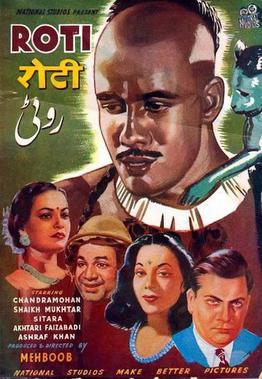Top Qs
Timeline
Chat
Perspective
Roti (1942 film)
1942 film From Wikipedia, the free encyclopedia
Remove ads
Roti (transl. Chappati or Flatbread) is a 1942 Indian Hindi film directed by Mehboob Khan. This movie was anti-capitalist.[1]
The film tells a poignant and critical story about the clash between two vastly different socio-economic systems: the rampant greed and individualism of modern, capitalist society, and the simple, communal life of a primitive jungle tribe.
This was Mehboob Khan's last movie before he set up his own production house.[2] The cast included Chandramohan, Sheikh Mukhtar, Sitara, Akhtaribai Faizabadi and Ashraf Khan.[3]
Remove ads
Plot
Summarize
Perspective
The film opens with a powerful montage depicting the stark reality of poverty and wealth, where "roti" (bread), a basic necessity, is fought over by the starving poor while the rich indulge in excess. This sets the stage for the film's central themes.
The plot primarily revolves around Laxmidas (Chandramohan), a wealthy and avaricious millionaire. Driven by an insatiable hunger for money and power, he embodies the corrupting influence of capitalism. His journey takes an unexpected turn when his airplane crashes in a remote jungle.
He is rescued by a tribal community, led by the noble Balam (Sheikh Mukhtar) and his companion Kinari (Sitara Devi). This tribe lives by principles of "primitive communism," sharing resources equally and holding no value for gold, which they see as the root of all evil. Their existence is harmonious and connected to nature, a stark contrast to the world Laxmidas comes from.
While recovering, Laxmidas observes their way of life and, despite initially being helped, his inherent greed eventually leads him to try and exploit them. He steals their buffaloes (Changu and Mangu) and makes his way back to the city, intent on resuming his pursuit of wealth.
In his innocent and simplistic way, Balam, accompanied by Kinari, follows Laxmidas to the city to recover his animals. However, they are quickly confronted with the harsh realities of urban life, where everything has a price and money dictates social standing. They find themselves exploited, humiliated, and unable to comprehend the city's materialistic values. Balam, a dignified tribesman, is forced into demeaning work in a cotton mill, highlighting the dehumanizing aspects of industrial labor. His disillusionment grows as he witnesses the city's moral decay and the suffering it inflicts.
Meanwhile, Laxmidas continues his relentless pursuit of wealth, resorting to increasingly ruthless methods, including murder and deceit. He ruins other wealthy men, hoards grain, and crushes striking workers, demonstrating the destructive power of unchecked greed. Darling (Akhtaribai Faizabadi), initially drawn to Laxmidas, witnesses his villainy firsthand.
The film's climax sees Laxmidas fleeing the city with his ill-gotten gold, accompanied by Darling. However, in a twist of fate, they become stranded in the desert. In a deeply symbolic scene, they encounter Balam and Kinari, who offer them water. Laxmidas, consumed by his pride and refusal to be indebted to those he despises, rejects their help, choosing to die of thirst rather than accept charity from the "primitive" people he once scorned.
The tribal couple, disillusioned by the city's corruption, ultimately return to their simple, communal life in the jungle, finding peace and fulfillment away from the material world. Laxmidas and Darling perish in the desert, surrounded by their worthless gold, signifying the ultimate futility of material wealth when detached from human connection and morality.
Remove ads
Cast
- Chandramohan[3]
- Sheikh Mukhtar[3]
- Jamshedji
- Sitara Devi[3]
- Akhtaribai Faizabadi[3]
- Nawab
- Agha Jani Kashmiri
Soundtrack
The film's soundtrack was composed by Anil Biswas with lyrics penned by Safdar Aah. Anil Biswas introduced Begum Akhtar as a singer in this movie.[4]
References
External links
Wikiwand - on
Seamless Wikipedia browsing. On steroids.
Remove ads

